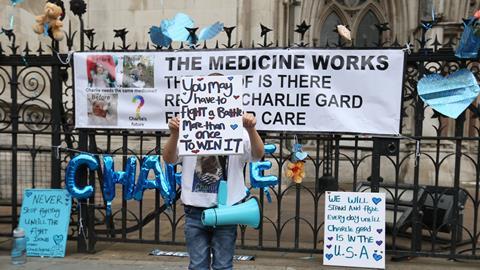Charlie Guard’s parents accepted that his life could not be improved, and that the only remaining course was for him to be given palliative care and to permit him to die with dignity. Accordingly, it was the Family Division’s duty to confirm its previous declarations, including that it was lawful and in Charlie’s best interests for artificial ventilation to be withdrawn and that he not undergo nucleoside therapy, but the court refused to make a mandatory order.
Great Ormond Street Hospital v Yates and others [2017] EWHC 1909 (Fam) Family Division Francis J
Minor – Medical treatment – Parental wishes
Background
The court previously made declarations, including that: (i) it was not in the best interests of the third respondent child, C, for artificial ventilation to continue to be provided, and that it was lawful and in his best interests to be withdrawn; (ii) it was in C’s best interests for his treating clinicians to provide him with palliative care only; and (iii) it was lawful and in C’s best interests not to undergo nucleoside therapy (see [2017] EWHC 972 (Fam)). C’s parents’ appeals to the Court of Appeal, Civil Division ([2017] All ER (D) 20 (Jun)), the Supreme Court and the European Court of Human Rights ([2017] All ER (D) 165 (Jun)) were unsuccessful.
The first and second respondent parents subsequently contacted the applicant hospital, asserting that the best interests assessment and declaration had been overtaken by events and were potentially unsafe, and that the best interests assessment was weighted significantly in favour of preserving C’s life and providing treatment. The hospital asked the court to affirm the declarations, if necessary, after hearing further evidence and to make orders in the same terms to remove any ambiguity. The parents later accepted that C’s life could not be improved and that the only remaining course was for him to be given palliative care and to permit him to die with dignity.
The court ruled:
Issues and decisions
Whether it was in C’s best interests to affirm the declarations and make orders.
The parents had had to face the reality that C was beyond any help, even from experimental treatment and that it was in his best interests for him to be allowed to die. Given the consensus that existed between the parents, the treating doctors and the parents’ medical expert, it was the court’s duty to confirm the declarations previously made. However, a mandatory order would not be made (see [14] of the judgment).
Katie Gollop QC (instructed by Great Ormond Street Hospital) for the hospital.
Grant Armstrong and Gerard Rothschild (instructed by Harris da Silva) for the parents.
Victoria Butler-Cole (instructed by CAFCASS) for the guardian.
Karina Weller - Solicitor (NSW) (non-practising).
































No comments yet